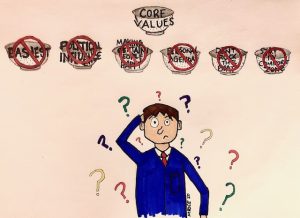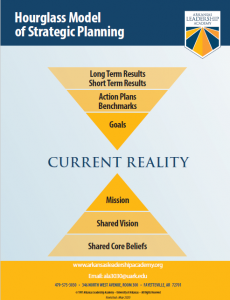TL;DR:
- Reflecting on our core values helps us filter through the decisions we make to ensure they are purposeful and effective.
- Involving team members in decision making can help to increase the likelihood that all members support the outcome.
- Using core values to make decisions helps to prevent decision-making fatigue.
Research shows that adults make an average of 35,000 decisions per day. If this is correct, this means that we are making one decision every two seconds throughout our day. According to researchers at Cornell University, we make about 227 of those decisions solely about food!
Although these decision-making numbers seem massive, the statistics do make sense. Each morning, we make multiple decisions. Do I get out of bed? What will I wear? What will I eat for breakfast? Do I drink coffee or juice?
As I ponder on the decision-making process, I have grouped our decisions into two categories. The first type of decision is the “intentional” decision. With intentional decisions, we spend time debating choice A or choice B and maybe even asking the opinion of others. The second type of decision is the “innate” decision; these are the decisions we make unknowingly. It is just a natural occurrence, like scratching an itch.
Just as we have individual core values, it is imperative that our school creates those core values and beliefs to be the filter for all decision making. Share on XDecision-making filters: separating the wanted from the unwanted.
Whether we are making intentional or innate decisions, we each have influences that cause us to make one choice over others. I call these our decision-making “filters.” You may be familiar with air, fuel, or water filters, among many other types of filters. When I am feeling like Emeril Lagasse and have a desire to actually “cook” something, my go-to entrée is my renowned spaghetti (all from a jar and a box). During this process, I must strain—or filter—the noodles from the water. In all cases, filters separate the wanted from the unwanted.
When faced with any decision, we mentally place all choices into our decision-making “filter.” Our filter separates the unwanted choices from the wanted choices. This makes our decision much easier. The message I want to share today is that our individual decision-making filters are unique and we all create our own filter.
So, what is your filter as an individual? What is your filter as an educator? Our filters are created by our individual core values and beliefs. Those core values are the fabric that makes up who we are as individuals. As an example, I have never sat in a restaurant and thought, “Should I pay for my meal, or could I just slither out the side door without paying?” I am making this innate decision based on my core values and beliefs as a person. I don’t consider any other choice.
Decision making in leadership.
Let’s go deeper with our conversation and discuss decision making and leadership. Previously, I shared that adults make an average of 35,000 decisions per day, but as your level of responsibility increases, so does the number of choices you are faced with throughout the day. Anyone in a leadership role will make many more decisions each day than those who are not in leadership roles.
At the time of this writing, school leaders are making multiple decisions each day on the topic of what school will look like this fall. Will students go to campus or will we have virtual classes? Do we offer both options, and who will teach each course? What will we do if a student or a teacher is diagnosed with COVID? In these cases, it is impossible to please everyone, so how should leaders determine the correct course of action?
Just as we have individual core values, it is imperative that our school creates those core values and beliefs to be the filter for all decision making. So why is it important to invest in the time developing these organizational core values?
Organizational core values are the “filter” through which all decisions should be made.
When I conduct teacher focus groups, one of the most common and frustrating pieces of feedback I receive is that their leader is not consistent with decision making. Filtering all decisions through our core values will increase consistency in decision making. Those are the benchmark.
Often, it is easy for leaders to make decisions based on personal agendas, making certain people happy, or ensuring we satisfy the political pressures. When leaders filter choices through the organization’s core values, they can ensure the final decision will be supported.
Core values are not fluid and should not adapt to fit specific outcomes.
When I served as a building principal, one of our core values addressed classroom environments. This core value stated that “all classrooms will be engaging and conducive to learning for all students.”
This did not mean all classrooms except the alternative learning classroom, the special education classes, and statistics. It meant all classrooms.
Also, this core value was not modified to mean “some” students. It meant all students.
Core values cannot be modified to fit the desired outcome. This is similar to drawing the bullseye around the bullet hole.
Organizational core values should be created and shared by all team members.
One of our core values at the Arkansas Leadership Academy states, “People will support what they help create.” All team members, including classified staff, must be involved in the process of creating the organizational core values.
Thus, core values must be shared and not forced on others. There is not a magical number of organizational core values. They must reflect the beliefs of all team members. Team members will support the outcome when we filter through core values.
[scroll down to keep reading]
Creating core values must not be a one-time “activity.”
Conversations about our core values must occur daily. As we make our 35,000 decisions each day, we must ask each other if our choices support our core values. Are the core values reflected in our instruction, how we treat students, how we treat each other, our expectations of student and adult learning, and every other aspect of our organizational culture? If an outsider visited your building, would this person find evidence of the core values you possess?
Making decisions based on our core values prevents “decision-making fatigue.”
There is a concept commonly known as “decision-making fatigue.” Simply defined, this concept states that after making many decisions throughout the day, our ability to make good decisions—or any decision—weakens over time.
We all have experienced this, I am sure. When we are fatigued, we often struggle with the simplest decisions. Which to spread first: the peanut butter or jelly? When we have decision-making fatigue, any decision becomes difficult, and there is less confidence in the decision-making ability.
We can avoid decision-making fatigue by filtering all choices through our core values. Leaders cannot afford to make important decisions about student and adult learning with decision-making fatigue.
Side note: This concept is really interesting to research. The intent is to create a lifestyle where there are fewer decisions so energy can be spent on important decisions. As an example, President Obama only wears a gray or blue suit every day. Mark Zuckerberg wears the same style of T-shirt every day. This creates more decision-making energy for more important matters. The goal is to limit the number of small decisions in your life.
Effective leaders understand the importance of filtering all decisions through the shared core values created by all team members. As our Hourglass Model at the Arkansas Leadership Academy expresses, the core values and beliefs are the foundation for every decision. If these are not in place as the foundation, the process will crumble.
In case you are wondering, and if our research is correct, it took me 4,375 decisions to write this blog.


Note: If you and your school district need guidance in the process of developing organizational core values, please feel free to reach out to me.
About Blaine Alexander
Dr. Alexander is currently serving his eleventh year as a Leadership Performance Coach with the Arkansas Leadership Academy through the University of Arkansas. Prior to his current experience in leadership development, Dr. Alexander served as a school administrator for 17 years. His research focuses on developing collaborative cultures founded on trust and respect and immersed in student and adult learning. Dr. Alexander’s dissertation explores the factors necessary for student voice to be institutionalized and taken to scale in a school district. Each year, he facilitates learning for students and teachers in the Arkansas Leadership Academy’s Student Voice Institute.
Education:
B.A. Harding University, Searcy, Arkansas
M.Ed. Harding University, Searcy, Arkansas
Ed.D. University of Arkansas, Fayetteville, Arkansas
Dissertation: Student Voice Initiative: Exploring Implementation Strategies


